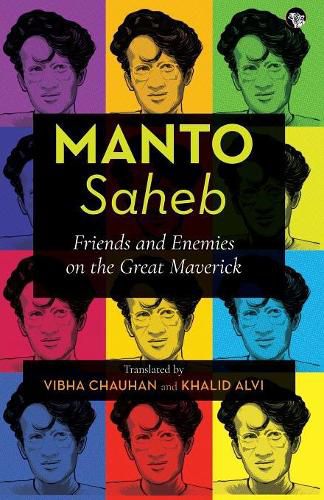Readings Newsletter
Become a Readings Member to make your shopping experience even easier.
Sign in or sign up for free!
You’re not far away from qualifying for FREE standard shipping within Australia
You’ve qualified for FREE standard shipping within Australia
The cart is loading…






This title is printed to order. This book may have been self-published. If so, we cannot guarantee the quality of the content. In the main most books will have gone through the editing process however some may not. We therefore suggest that you be aware of this before ordering this book. If in doubt check either the author or publisher’s details as we are unable to accept any returns unless they are faulty. Please contact us if you have any questions.
‘Saadat Hasan Manto has a good claim to be considered the greatest South Asian writer of the 20th century… [He] incarnated the exuberance, the madness, the alcoholic delirium of his time…’–Suketu Mehta, The New York Times
This remarkable anthology brings together stories about Saadat Hasan Manto, essayist, scriptwriter, and a master of the short story, by his friends, family and rivals–among others, Ismat Chughtai, Upendranath Ashk, Balwant Gargi, Krishan Chander, his daughter Nuzhat and nephew Hamid Jalal. These are accounts of grand friendships and quarrels, protracted drinking bouts, cutthroat rivalries in the world of Urdu letters, and intense engagement with issues of that turbulent age. Together, they form an unprecedented portrait of the literary and film worlds of the time, and of the great cities of Bombay, Delhi and Lahore.
They also offer a glimpse of the making of a legend even as they reveal Manto as a complex man of many contradictions. A devoted husband and father, he was as comfortable at home as he was at prostitutes’ quarters, seeking new material. Generous to a fault, he freely gave away his earnings and often put his family in financial jeopardy. Fiercely competitive and an outspoken critic of others’ writing, he brooked no criticism of his own, at times choosing to sever ties rather than have his words tampered with. And, for much of his adult life, right until the end, Manto was an alcoholic who fiercely defended his choice to remain one.
Honest, frank and personal, at times sentimental, and critical–even gossipy–at others, the pieces in Manto-Saheb constitute an unparalleled, multi-faceted biography of a genius
$9.00 standard shipping within Australia
FREE standard shipping within Australia for orders over $100.00
Express & International shipping calculated at checkout
This title is printed to order. This book may have been self-published. If so, we cannot guarantee the quality of the content. In the main most books will have gone through the editing process however some may not. We therefore suggest that you be aware of this before ordering this book. If in doubt check either the author or publisher’s details as we are unable to accept any returns unless they are faulty. Please contact us if you have any questions.
‘Saadat Hasan Manto has a good claim to be considered the greatest South Asian writer of the 20th century… [He] incarnated the exuberance, the madness, the alcoholic delirium of his time…’–Suketu Mehta, The New York Times
This remarkable anthology brings together stories about Saadat Hasan Manto, essayist, scriptwriter, and a master of the short story, by his friends, family and rivals–among others, Ismat Chughtai, Upendranath Ashk, Balwant Gargi, Krishan Chander, his daughter Nuzhat and nephew Hamid Jalal. These are accounts of grand friendships and quarrels, protracted drinking bouts, cutthroat rivalries in the world of Urdu letters, and intense engagement with issues of that turbulent age. Together, they form an unprecedented portrait of the literary and film worlds of the time, and of the great cities of Bombay, Delhi and Lahore.
They also offer a glimpse of the making of a legend even as they reveal Manto as a complex man of many contradictions. A devoted husband and father, he was as comfortable at home as he was at prostitutes’ quarters, seeking new material. Generous to a fault, he freely gave away his earnings and often put his family in financial jeopardy. Fiercely competitive and an outspoken critic of others’ writing, he brooked no criticism of his own, at times choosing to sever ties rather than have his words tampered with. And, for much of his adult life, right until the end, Manto was an alcoholic who fiercely defended his choice to remain one.
Honest, frank and personal, at times sentimental, and critical–even gossipy–at others, the pieces in Manto-Saheb constitute an unparalleled, multi-faceted biography of a genius